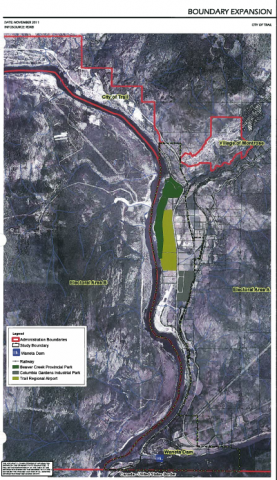Crunching the numbers: Some facts in break-down of new Trail/Teck deal
The City of Trail is offering more specific numbers regarding its plans to expand city boundaries to include the Columbia River Valley (encompassing the airport and Waneta Dam) almost all the way to the U.S Border (see attached map).
Mayor Dieter Bogs said the city was approached by RDKB Area A business owners (the Waneta Industrial Property Owners Group headed up by Kathy Bruce from Toxco) in August 2011 to consider the notion, as annexation would provide the businesses with tax savings, as well as more services and infrastructure development (roads, sewers, etc.).
“RDKB will lose the Columbia River Valley part of Area A … (which will mean) losing significant tax dollars, all of which has been assigned to Beaver V alley Recreation Society,” he added, explaining one of the larger remaining barriers will be mitigation negotiations to ensure Beaver Valley is content with the change.
City CAO David Perehudoff said there are eight residents who live in the area.
“There are 66 parcels in total,” he said, offering an ownership breakdown: one is federally-owned, 10 provincially, 37 by private businesses, 12 by private individuals, one by BC Hydro, two by Crown BC Transportation, two by the RDKB (airport), (and) one by the Village of Montrose. “The general assessed value is $76,687,300.”
Estimates of how this would alter Trail’s tax base are from a 2011 report that may not reflect current values, particularly given the Waneta Expansion project.
“The total estimated revenue increase to the city in the Boundary Extension Report is $749,700. It is noted that this is based on 2011 estimates and is subject to change once the report is updated to reflect 2013 figures,” he said.
As for how Teck would be impacted by the new agreement, the company’s taxes will be lowered from 63 per cent to 55 per cent over a five year period.
“Once Teck’s property taxes are reduced to 55 per cent, city taxes will be reduced by approximately $800,000,” Perehudoff said. “This does not, however, include any ongoing increases to the overall municipal tax levy, of which Teck pays 55 per cent. In addition, this would be offset by the $225,000 indexed annual economic development payment (promised to the city annually for 20 years).”
Teck has also committed to a one-time, $1-million payment to the city at the outset for economic development projects.
Mayor Bogs said this is a completely separate process from the city’s bid to take over the airport – but it would bring the airport within city boundaries.
“From my perspective, this (the expansion) is an exciting move for Greater Trail. We’ll have the opportunity to really, really do some economic development with the company’s support,” he said, adding fiscal support is only a piece of that – Teck’s collaboration also means access to the contacts, networking and influence of the massive company.
“It will make Greater Trail much more sustainable than it is today,” he concluded. “This is for the benefit, not only of Greater Trail, but for the entire region.”
Next steps include commissioning a new, updated study, mitigation negotiations with the RDKB regarding Beaver Valley, and provincial approval, but officials hope the boundary expansion could be a reality in as little as 18 months.

























